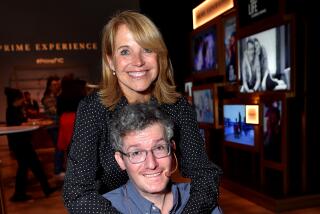‘Our Ticket to Acceptance’ : Actor With Down’s Syndrome on ‘Life Goes On’ Has Become a Role Model for Many
- Share via
ABC made history when it went out on a limb last year to bank $10 million on the series “Life Goes On,” a family drama in which one of the children not only was portrayed as having Down’s syndrome but also was played by an actor with the genetic disorder. Chris Burke, 24, was the first performer with a developmental disability to be given a part of such substance in series television.
Fifteen months later, the series has earned critical plaudits and runs a respectable second to “60 Minutes” on Sunday nights. More important, Burke and his character, Corky Thacher, have become a symbol of hope to throngs of viewers.
“You are my hero. You have helped change my world,” a teen-ager with Down’s syndrome wrote Burke. Every week, the actor receives more than 100 such letters, from young people with the disorder, from their families and from people who work in the field improving the lives of those who live with the disability.
The letters are just one reflection of the impact of “Life Goes On.” Beyond its vital effect on the Down’s syndrome community, it has dramatically increased public awareness of the disability, dispelled many of the myths that surround Down’s and helped viewers to understand that people who have it can be productive members of society.
“In terms of public awareness,” says Sheila Hebein, executive director of the Chicago-based National Assn. for Down Syndrome, “I think they have accomplished more in one year of television programming than we had previously accomplished in 20 years.”
Hebein reports that the kids in her community watch it religiously. “They idolize him. They are so happy that a person with Down syndrome is successful.”
Spurred on by Burke’s achievements, an improvisational comedy group was formed in Chicago in the fall of 1989 by actor Jim Gill. Modeled on the Second City Improv Group, the Elaine Settler Players’ North Shore Drama Circle brought together more than 20 teen-agers for weekly workshops, most with Down’s. They eventually put on a one-night performance at Northwestern University, and now two workshops are being conducted.
Donna Rosenthal, executive director of the New York-based National Down Syndrome Society, feels that one of the most important things “Life Goes On” does is show Corky in a natural, positive environment where he faces problems and deals with them the way anyone else would. “He is leading a normal life with a family. His hopes, feelings and dreams are like everyone else’s.”
Hebein concurs. “That family is being treated normally on TV. Now, maybe people will see our family as typical too.”
The enhanced self-esteem that comes from seeing someone with Down’s syndrome treated as a complete and emotionally rich human being extends to members of their families. After the first few episodes of the series aired, the teen-aged brother of a 21-year-old with the disability, jubilantly announced to his mother, “Mom, I can’t believe it. We’re in. Down syndrome is in.” His excitement is echoed in a letter from a mother to Burke, “You are our ticket to acceptance.”
That acceptance is taking fire in the general population. Rosenthal reports a marked increased in volunteers for her society in the New York area. She also believes it is helping young people to feel comfortable about their peers with Down’s syndrome. “It’s preparing us to interact with them.”
Frank Burke, Chris’ father, is hearing parental anecdotes that reflect a breaking down of the barriers of discomfort. A young mother recently told him the story of taking her baby to the market. Pushing her son in the shopping cart, she suddenly found people approaching her, chucking her child under the chin and chatting away. “He is like the boy on ‘Life Goes On,’ ” they remarked.
A year ago, she said, shoppers in a similar situation would have shunned her youngster.
The notion that people with Down’s syndrome are unapproachable and cannot socialize is one of many myths being kicked out the window by the series. Another is the falsehood that those with the developmental disability are perennially happy. “They are just like the rest of us,” Hebein says.
In this second season of the series, Chris Burke is experiencing a lot of highs.
Burke says he is extremely thankful for the chance he’s been given. “It’s a big job for me. But it gives me the opportunity to see what I can do. I can stretch myself.”
From all reports, it’s a very long stretch indeed. Series creator and executive producer Michael Braverman says he’s remarkable. “Chris has grown exponentially over the last year.”
Bill Smitrovich, who plays the father in “Life Goes On,” agrees. “When I first started working with Chris, I thought of him as someone with Down syndrome who wanted to be an actor. Now I think of him as an actor with Down syndrome.”
Rosenthal is optimistic that others will now be given a similar chance. “I think the series is opening new doors in education and employment,” she says. “The episodes on Corky’s baby-sitting and his mainstreaming in a regular classroom show that it’s do-able. I think we’re going to see many more Chris Burkes.”
More to Read
The complete guide to home viewing
Get Screen Gab for everything about the TV shows and streaming movies everyone’s talking about.
You may occasionally receive promotional content from the Los Angeles Times.






